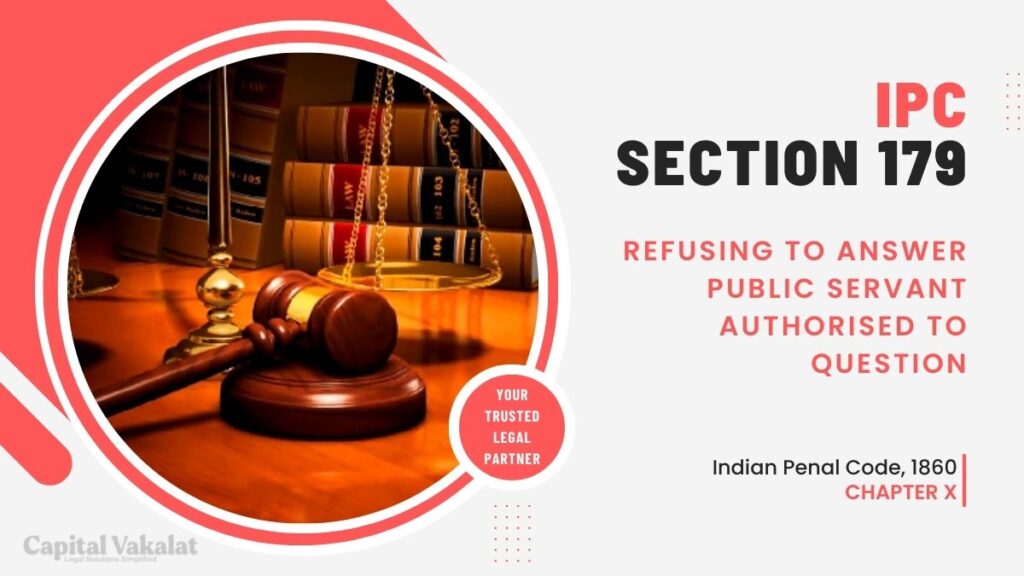In the intricate tapestry of India’s legal system, Section 179 of the Indian Penal Code (IPC) holds a unique place. This provision deals with the act of refusing to answer a public servant who is authorized to question you. It has significant implications for individuals, public servants, and the broader legal framework.

In this article, we will dive into the depths of Section 179 IPC and explore its importance and implications.
Understanding Section 179 IPC
Section 179 of the Indian Penal Code is a legal provision that addresses the refusal to answer a public servant who has been duly authorized to ask questions. The law emphasizes the duty of individuals to cooperate with public servants in the discharge of their official duties. Public servants often require information from citizens to maintain law and order, conduct investigations, and ensure public welfare.
The Importance of Section 179 IPC
This provision serves as a cornerstone in maintaining the balance between individual rights and the collective good. It upholds the idea that cooperation with public servants is vital for the smooth functioning of the state and the protection of public interest. This cooperative framework enables authorities to carry out their responsibilities effectively.
Who Can Be Considered a Public Servant?
The term “public servant” encompasses a broad spectrum of individuals working in various government capacities. It includes government employees, law enforcement officers, administrative personnel, and anyone authorized to perform public duties. Their roles can range from a beat constable on the streets to high-ranking government officials.
Powers of a Public Servant
Public servants are vested with certain powers to perform their duties. These powers are designed to ensure they can carry out their responsibilities effectively. Public servants may question individuals, seek information, and take necessary actions as per their legal authority.
Refusing to Answer a Public Servant
Refusing to answer a public servant who is authorized to question is a violation of Section 179 IPC. This can occur when an individual, without reasonable cause, declines to provide the requested information or deliberately misleads a public servant.
Legal Consequences of Non-Compliance
Non-compliance with Section 179 can result in legal repercussions. Individuals found guilty of refusing to answer a public servant may face penalties, including fines and imprisonment. It’s essential to understand the seriousness of this offense.
When Can You Refuse to Answer?
While Section 179 emphasizes cooperation, it also recognizes that there may be legitimate reasons for not answering a public servant’s questions. For instance, a person cannot be compelled to self-incriminate. It’s essential to know your rights and obligations.
The Right to Remain Silent
In a democratic society, individuals have the right to remain silent to avoid self-incrimination. This principle is enshrined in the legal system and ensures that no one is compelled to confess to a crime or provide evidence against themselves.
How to Deal with Questioning by a Public Servant
When questioned by a public servant, it is essential to remain calm and composed. While cooperation is encouraged, understanding your rights and acting within the legal framework is equally important. Seek legal advice if necessary.
Recent Legal Cases
Recent legal cases have brought Section 179 IPC into the spotlight. These cases highlight the complexity of balancing individual rights with the responsibilities of public servants. Legal experts and courts continue to deliberate on these matters.
Public Perceptions and Controversies
Public perception of Section 179 IPC can vary widely. Some view it as a necessary tool to maintain order, while others express concerns about potential misuse. Controversies surrounding this provision underscore the need for a careful examination of its implications.
Balancing Rights and Duties
The legal framework surrounding Section 179 IPC emphasizes the delicate balance between individual rights and the duties of public servants. Striking this balance is crucial for a just and functioning society.
Conclusion
In conclusion, Section 179 of the Indian Penal Code, which pertains to refusing to answer a public servant authorized to question, is a critical provision in the legal landscape. It underscores the importance of cooperation with public servants while respecting individual rights. Understanding the nuances of this provision is essential for all citizens.
Frequently Asked Questions
Who is considered a public servant under this section?
Public servants encompass government employees, law enforcement officers, and those authorized to perform public duties.
What are the legal consequences of refusing to answer a public servant?
Non-compliance may result in penalties, including fines and imprisonment.
When can I refuse to answer questions from a public servant?
You can refuse to answer if your response may self-incriminate, as you have the right to remain silent.
How can I protect my rights when questioned by a public servant?
Remain calm, understand your rights, and seek legal advice if necessary to ensure you protect your rights within the legal framework.